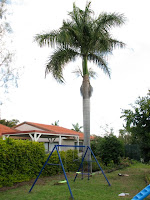 This weekend I bought a mulcher. It was made in China, which is generally considered to have some of the worst industrial practices in the world in terms of environmental impact and social justice. It came in a box with styrofoam, plastic bags and bubble-wrap. Large portions of the product itself are made of plastic which is probably not recyclable. Oh, and it can use as much electricity in about two and half hours as the rest of the house does in a whole day (not counting hot water).
This weekend I bought a mulcher. It was made in China, which is generally considered to have some of the worst industrial practices in the world in terms of environmental impact and social justice. It came in a box with styrofoam, plastic bags and bubble-wrap. Large portions of the product itself are made of plastic which is probably not recyclable. Oh, and it can use as much electricity in about two and half hours as the rest of the house does in a whole day (not counting hot water).So what was I thinking?
 Well there's a lot growing in our back yard including a couple of monster palm trees which drop enormous fronds on a regular basis. We have hibiscus bushes and on three sides a border of sheena's gold, all of which need to be trimmed frequently or they get out of hand. In order to make room for tank #1 I had to remove (by hand) one small tree and while I was at it I removed another (by hand) which had established itself in what is ostensibly the vege garden. Both of the trees, a half dozen fronds and a heap of prunings all piled together were starting to look like a fabulous snake refuge for the coming summer.
Well there's a lot growing in our back yard including a couple of monster palm trees which drop enormous fronds on a regular basis. We have hibiscus bushes and on three sides a border of sheena's gold, all of which need to be trimmed frequently or they get out of hand. In order to make room for tank #1 I had to remove (by hand) one small tree and while I was at it I removed another (by hand) which had established itself in what is ostensibly the vege garden. Both of the trees, a half dozen fronds and a heap of prunings all piled together were starting to look like a fabulous snake refuge for the coming summer.In rural areas and in times past, people would simply burn much of this material either as fuel or simply to get rid of it. That's not permitted in cities like Brisbane (for good reason). Here, this material is considered "waste" and so it is subjected to the same general rule which applies for other waste - it gets transported to a central waste transfer station and "processed". If I don't want my garden trimmings rotting in landfill I have to put them in a trailer and drive more than 15 minutes each way to drop them off myself - or pay somebody else to make the trip for me.
But I don't see this material as waste. It's a resource which I want to use here as compost or mulch. I tried for a while stripping the green leaves from the hibiscus prunings by hand so as to make a suitable material for compost, but in the end it just wasn't working. And how am I supposed to manually make mulch from those huge palm fronds?
In a bygone era there might have been mulching machines which could be powered by hand (or foot, or horse... or children). I very much doubt I could track one of those down these days. In the end there wasn't much choice. I had to go with what's available.
One aspect of the decision was easy: I wanted an electric one rather than something with a petrol engine, because I know I can buy 100% of my electricity from renewable, non-polluting sources. Beyond that it was just a question of choosing something that would get the job done. And I have to say... well actually no, I won't "say" anything. I'll just let the results speak for themselves.


3 comments:
I went through exactly the same dilemma Terry when we bought ours! But as you say, the mulch is too valuable a resource to send off to the tip, and we generate LOADS of it. I try not to look at the Cent A Meter when DH is using it though :-(
I'm not sure what the story is with tips on the north side, but "green waste" is processed as exactly that down here at Chandler — and is indeed mulched/composted rather than ending up in the general landfill.
You can even buy bags of the stuff, I believe — and it's that pile which gets you a bag of free mulch in return for your green waste every second year.
G'day Iain,
Yes the waste transfer station has a dedicated area for green waste processing, but in order to utilise it I have to transport the stuff there myself using my car. Maybe if I had an electric car I wouldn't mind so much but for now I would rather not make that trip.
If I put green waste in the wheelie bin it ends up rotting in the landfill because there's no separation. Some shire councils have dedicated bins for green waste. We have just the two: one for landfill and one for recycling of materials like plastic and paper.
Post a Comment